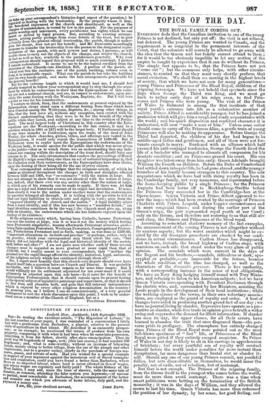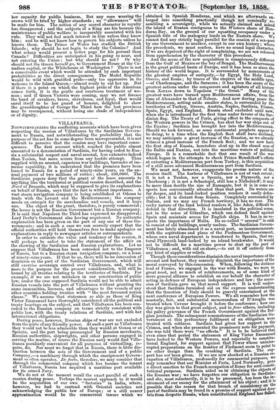TOPICS OF THE DAY.
THE ROYAL FAMILY COMING OUT.
EVERYBODY feels that the Canadian invitation to one of the young Princes is not declined, but only put off; the visit is not refused, but deferred. The young Princes are wanted in Canada, and the requirement is so congenial to the permanent interests of the Court, that the colonists will scarcely be allowed to go away with the idea that the Queen and her family cannot attend to them ; for it would be too obviously impolitic to let any section of the empire be taught by experience that it can do without its Princes. The simple fact appears to be, that the Princes have not yet " come out " ; but the summons only helps, with other circum- stances, to remind us that they must very shortly perform that social evolution. We shall then see moving in the highest levels of society, that which we have not seen for many generations— young Princes and Princesses of the Blood Royal, children of the reigning Sovereign. We have not beheld that spectacle since the days when George the Third was King, and we must .go back to rather early days of his reign even, to find Pnn- eesses and Princes who were young. The visit of the Prince of Wales to Balmoral is among the first incidents of that royal youth's entrance into life as a substantive member of society. Prince Alfred is considerably younger, but he has joined a profession which will give him a rough and ready acquaintance with the world ; and his quick disposition and confident character it is understood, will soon " make a man of him." Unless some suitor should come to carry off the Princess Alice, a gentle train of young Princesses will also be making its appearance. Before George the Third had departed, the children of his day had begun to be middle-aged ladies and gentlemen, and all of them were not for- tunate enough to marry. Burdened with an alliance which half excused his anti-conjugal tendencies, George the Fourth lived the life of a bachelor who managed to alienate all compassion for his desolate condition ; and no Princesses graced his court. His one daughter was taken away from him early. Queen Adelaide brought William the Fourth no children. Before the Duke of Cumberland had settled down into quiet life, he had gone abroad , and theyounger branches of his family became strangers to this country. The sole acquaintance which we have had with rising royalty has been in the Cambridge family, not very numerous, and represented before the home-keeping public by a single Princess ; for the Princess Augusta had been borne off to Mecklenburg-Strelitz before the Princess Mary succeeded her in the Cambridge-box at the Opera-house. Queen Victoria and Prince Albert appeared to re- new the hopes which had been created by the marriage of Princess Charlotte with Prince Leopold, under happier circumstances and in more congenial times ; and during the earlier part of the Queen's reign, the pair represented royal youth at our Court; only on the throne, and therefore not restoring to us that still all sent class, the Princes and Princesses of the blood royal. According to somewhat shadowy memory of the last examples,
the announcement of the coming Princes is not altogether without its anxious aspects ; but the worst anxieties which might be ex- cited by the old Georgian precedents are checked by our confi- dence in actual circumstances. Carlton House has disappeared, and we have, instead, the broad highway of Carlton steps, with mansions on each side that stand under the very glare of public opinion. The scandals which were current in the days of
the Regent and his brothers,—scandals, ridiculous or dark, apo- cryphal or probable,—are impossible for the future, because the whole condition of the time has changed, as well as the characters of the dramatis personee. There is less uncharity, with a corresponding increase in the sense of real obligations. We have no Tory King hedging himself round with Tory Minis- ters, and refusing to listen to his American subjects ; but we have Queen Victoria corresponding with President Buchanan through the electric wire, and, surrounded by her Ministers, assisting the Leeds people in the development of their local institutions ; while the working classes of the towns, in their own voluntary associa- tions, are employed as the guard of royalty and order. A host of changes have aided in producing another grand fact of our day ; we have no journal living by slander. Repressive laws operate as a pre- ventive on slander, while free trade in opinion gives to truth a wider swing and supersedes the demand for illicit information. If slander has seen its day, the upper classes, for all their errors, have learned to abandon the trait that once disgraced them—the per- verse pride in profligacy. The atmosphere has entirely changed since Princes of the Blood Royal were pointed out as the most full-blown specimens of " fast" life, or Princesses of the Blood Royal were pitied if they entirely escaped suspicion. No Prince of Witles in our day is likely to sit in his carriage in apprehension of brickbats ; but every youthful son of royalty will conduct
himself before the world under penalties far more instant than decapitation, far more dangerous than brutal riot or slander it-
self. Should any one of our young Princes commit, i not youthful follies, but acts discreditable in themselves, he would.incur the penalty, not of exile, not of rebellion, but of contempt.
But that is not enough. The Princes of the reigning family,
from the throne itself to the youngest who conies before the world, must do more than avoid contempt. There was a time when smart politicians were betting on the termination of the British monarchy ; it was in the days of William' and they allowed the crown to last his time. Queen Victoria has more than redeemed the position of her dynasty, by her sense, her good feeling, and her capacity for public business. But any 9/1(01 wearing the crown will be tried by higher standards ; no " allowances' will be made for him. The notion of any sacred character in royalty has disappeared ; and the subjects of a King are his because the maintenance of public welfare is inseparably associated with his rule. They will not feel much interest in him unless they know. him ; and he will not know how to .govern his subjects unless he knows them. The Prince of Wales has studied the British Islands; why should he not begin to study the Colonies ? And what colony would present a better page for his perusal than Canada ? Difficulties are anticipated in his going so near, and not entering the Union ; but why should he not ? Or why should not the Queen herself go, to Government House at the Ca- nadian capital, or the Whitehouse at Washington ? There is not a conceivable event which would be attended by such important probabilities as the direct consequences. The Model Republic would be wild with gratified pride—only too oppressive in its welcome to the Island Queen,—almost ready to eat her up. But if there is a point on which the highest pride of the American comes forth, it is the gentle and courteous treatment of wo- man ; and if Queen Victoria were coming, may we not foresee the band of cavaliers, brave, chivalrous, and loyal, that would enrol itself to be her guard of honour, delighted to show the granddaughter of George the Third how the lost provinces may be reconquered, without losing one shade of independence or of dignity.



























 Previous page
Previous page